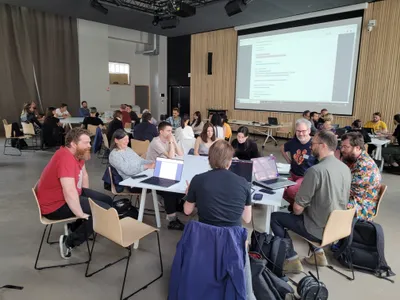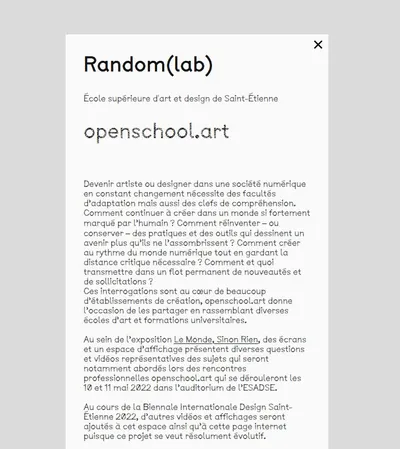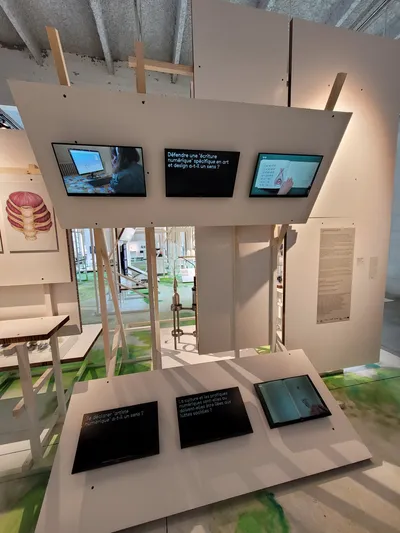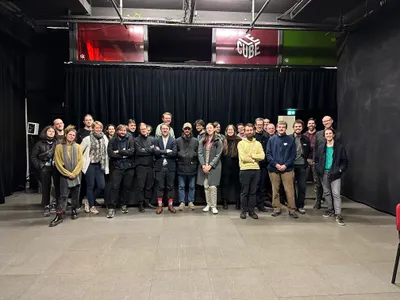openschool.art
Professional meetings, 10-11 May 2022, Esadse

Becoming an artist or a designer in a rapidly evolving digital society requires adaptability and a deep understanding of its dynamics. How can we navigate a world that is strongly influenced by human actions? How do we reinvent or preserve practices and tools that contribute to a brighter future instead of overshadowing it? Maintaining a critical distance while creating at the speed of the digital world is essential. Furthermore, how do we effectively transmit our ideas amidst the constant flux of new stimuli? These fundamental questions resonate with many creative institutions, and openschool.art provides a unique opportunity to address them by bringing together various art schools and universities.
On the 10th and 11th of May 2022, approximately fifty teachers and students from French art and design schools gathered in ESADSE's auditorium to discuss the challenges involved in teaching digital creative practices.
Questions we discussed together:
- Are digital practices in art schools a game changer for the real world?
- Can we teach digital practices without environmental awareness?
- What is the common ground for a shared digital culture? or What are the basis of a common digital culture?
- What are the good digital practices to share with art and design students?
- Should we teach tools AND design? or Does digital design education go hand in hand with teaching tools?
- Can we be a digital artist without knowing computer programming? or Can a digital artist be ignorant of computer programming?
- Is digital art history a needed knowledge for a contemporary artist?
- Does the status "digital artist" make sense? or Is it meaningful to claim to be a "digital artist"?
- Does the status "digital designer" make sense? or Is it meaningful to claim to be a "digital designer"?
- Does digital design involve a particular ethic?
- In our digital society, should computer programming be a skill of the contemporary designer or artist's toolbox?
- Does digital design facilitate inclusive design?
- Should a digital artist or designer be self-reliant for technical knowledge?
- Should a digital designer be able to design algorithms?
- Should hacking be included in digital design education?
- Is integrating digital into a project an ideological act?
- Is peer-to-peer learning the most effective way to master digital tools?
- Can digital design training be delegated (or outsourced) to tutorials?
- Is there a minimal technical base, common to all digital creation?
- Should art and design schools train computer programming artists or equipped creative individuals?
- How does digital transforms drawing and volume teachings?
- Regarding art and design schools, should we value computer programming or should we rather privilege "no code" environments?
- Does using software or digital production tools (laser cutting, 3D printer...) in a work make it be a digital project?
- Can we make digital do-it-yourself practices fit into the pedagogy of art and design schools?
- What position should video games have in art and design education?
- How can we value collaborative and cooperative practices within digital design?
- Are there any specificities related to digital creation?
- What is the position of industry-derived vocabulary inside creative digital practices?
- Is metaverse a place for creation?
- Should we train artists and designers to metaverse?
- Should digital culture and practices be connected to social struggles? Are they naturally linked together?
- As new business models for creation, should NFTs be included in pedagogy within art and design schools?
- Is it possible to be original and creative using proprietary software (Adobe, Microsoft...)?
- Does teaching proprietary software (Adobe, Microsoft...) in creative schools produce creators or consumers?
- Does promoting a specific "digital writing" in art and design make sense?
- Is artificial intelligence a tool to be taught in the creative field?
- Who is the author when a work is created autonomously by an algorithm?
With the involvement for this session 2022 of:
École européenne supérieure d'art de Bretagne, site de Rennes (EESAB Rennes) École européenne supérieure de l’image Angoulême-Poitiers (ÉESI) École nationale supérieure d’arts Paris-Cergy (ENSAPC) École nationale supérieure des Arts Décoratifs (EnsAD Paris) École nationale supérieure des beaux-arts de Lyon (ENSBA Lyon) École nationale supérieure des beaux-arts de Paris (ENSBA Paris) École supérieure d’art d’Aix-en-Provence Félix Ciccolini (ESAAIX) École supérieure d’art et de design d’Orléans (ESAD Orléans) École supérieure d’Art et de Design de Reims (ESAD Reims) École supérieure d’art et de design des Pyrénées (ÉSAD Pyrénées) École supérieure d’art et de design TALM-TOURS (ESAD TALM-TOURS) École supérieure d’art et design de Saint-Étienne (Esadse) École supérieure d’art et design Le Havre Rouen (ESADHaR) École supérieure d’arts & médias de Caen-Cherbourg (ésam Caen) Haute école des arts du Rhin (HEAR) Université de Nîmes (Unîmes) Université de Strasbourg (Unistra) Université Rennes 2
openschool.art in Le Monde Sinon Rien exhibition
Biennale Internationale Design Saint-Etienne 2022
Since our event coincided with BID Saint-Etienne, we had the opportunity to showcase openschool.art as part of the 'Le monde, sinon rien' (The world or nothing) exhibition, which featured projects from students and young researchers representing five French art and design institutions.
The 'Le monde, sinon rien' (The world or nothing) exhibition served as an extensive experimental platform open for public participation. Upon entering the exhibition, visitors encountered a large floor map representing a realm of exploration---the very landscape that art and design school teachers offer their students each year, which they traverse, document, and transform.
Curated by Sophie Pène (lecturer-researcher at the Learning Planet Institute) and Benjamin Graindorge (designer and lecturer at ESADSE), the exhibition dedicated a space to openschool.art, both physically within the exhibition and on the website.

We decided to showcase the questions that were discussed during the professional meetings, alongside videos that were inspired by those questions and produced by some of the participating schools. Throughout the entire Biennale, videos and displays were continuously added as the ideas and discussions evolved.

openschool.art, second edition
20-21 March, ENSAD (Paris)

The latest openschool.art session took place in Issy-les-Moulineaux, hosted by ENSAD Paris. It served as an open forum for digital educators from French art schools and universities to engage in discussions on a wide range of issues. During this session, participants focused on four main themes: "The impact of AI on art and schools," "Exploring alternatives to Adobe: common tools for schools and resource sharing," and "Exploring digital tools through collective practice".
One question that remains unanswered is the role of students, which needs to be reconsidered. In this regard, a compelling proposal would be to consolidate the financial resources allocated to the event, allowing for the inclusion of students with diverse profiles and backgrounds. This approach is crucial in ensuring a diverse range of thoughts and practices around the table.